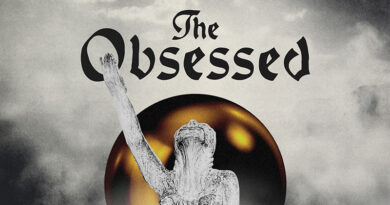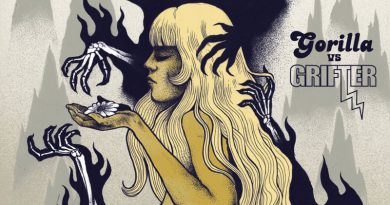Review: Lull ‘Journey Through Underworlds’ [Reissue]
Mick Harris’ work as Lull was made for days like today. It’s dark outside. Not because it’s nighttime, but because heavy storm clouds are swirling across the afternoon sky. Yesterday, there was sunshine, and it felt like maybe spring was here. Not today. Today is colder, and the wind is whistling around the corners of my cousin’s flat where I’m staying as a peaceful retreat to write. Or try to write.
![Lull 'Journey Through Underworlds' [Reissue] Artwork](https://www.thesleepingshaman.com/wp-content/uploads/2024/05/Lull-Journey-Through-Underworlds.jpg)
It’s dim enough to turn a light on, but I don’t. Now, I’m listening to Journey Through Underworlds, the very first Lull album the ex-Napalm Death drummer and Scorn helmsman recently reissued after the original release suffered the disco rot fate met by many albums from the late 80s-early 90s. The album is one of the earliest to explore a sound that would become dark ambient. In its droning menace, you can hear the origins of the genre, its devotion to ominous atmospheres, unsettling drones, sound as a descriptor.
This newly reissued version is resplendent with gorgeous, chthonic artwork courtesy Abby Helasdottir (Gydja). Looking at it while hearing the first rumblings of Downwards, the opening track, gives the impression of following some strange, diagrammatic map through those mists. As the sounds morph, it begins to feel like being carried along by some strange creature, a denizen of this underworld, that map you thought you had suddenly unrecognizable jumble. When we reach the tracks conclusion, there’s a sense that we are left almost where we began. Or maybe better said, we are left at another doorway than the one we came in through. One we must now pass through on our way to the center of this place.
As the title track, Journey Through Underworlds, begins to pour like black smoke from the speakers, it at first mimics Downwards, signifying a continuation of our passage through this alien and hostile landscape. The droning tones here reverberate in such a way they suggest a vast cavernous space. Perhaps this is the first part of that journey the song describes, a way through and on into some other place.
As in the opening track, Harris’ choice of layered sounds seems drawn from a mixture of the organic and inorganic. The distorted origins defamiliarize the sounds and make them feel wholly unnatural. As the track progresses, these sounds create a kind of crescendo that gives no relief, only further drawing out a feeling of vigilant waiting. But waiting for what? From what has become a swirl of darkness, strange signals emerge: the wind’s voice, maybe, and a noise made by something alive, something better left unseen in the claustrophobic, cavernous dark. As the track nears its endpoint, it becomes subtly more distorted. The low rumble, the wind’s call, and metallic scraping give way at last to an open space.
The chant-like sounds that In The Distance begins with initially offer a moment of calmness and stillness, that contrasts with what felt like a constant forward momentum. Soon enough, though, we are inexorably drawn closer and closer to the center – if a center can be found – of the netherworld Harris’ compositions describe. When that sound of chanting fades, the noise of metal-on-metal rises to the fore, a clanging anti-beat produced in a stifling, chthonic industrial unit. The sound of the machinery that powers this place.
Harris’ discomfiting atmosphere of vibrant, living darkness demonstrates his skill at using sound as a descriptor for things that our words alone may not transmit fully…
There is, again, that constant sense of organic and inorganic sounds melding and clashing. It’s disorienting, making it impossible to get a firm grasp on the place Harris has guided you to. And then that clanging anti-beat fades away, and in that moment you realize you came to rely on it to mark the passage of time. Time as the song sets, not the time of the ordinary world. Minutes pass differently here, and this song has forty-five of them to bend and distort. Their passage is wrong, like a dream that seems to take place over years yet happens all at once.
When that metallic clanging returns, then morphs into something like the beating of a heart, there’s relief, at last. It is a relief, though, tempered by the feeling of finally being engulfed by and lost in this menacing darkness. The relief of surrendering and accepting the unknown of where you have been taken and where you might be going. The beat is underpinned by what sounds like great breaths of air and the two – that beat and that breath – blend to create an unsettling of the familiar this album does so well. Heartbeat, inhale, exhale, and just when you get used to it, it begins to be covered over by jittery, impatient sounds.
The beat speeds up, turns mechanical, the breath subsumed and becomes something like the noise of a large engine. Perhaps this is the breath and heart of the place you’ve been drawn into. Then, musical tones, almost chiming. A percussive instrument bent and warped against the low roar that’s been a companion throughout these three tracks. It doesn’t last, of course, as with any almost-familiar sounds you hear. It slowly distorts and morphs beyond recognition. And you are engulfed again in some swirling vortex of sound, panning from left to right, insistent as hurricane winds.
When we at last make egress from this underworld, it is through a grating wash of sounds that propel you outwards while also forcing you to remain immersed in them, even as their reverberations die away. After, the silence leaves you ill at ease, it is as oppressive as the journey was. You notice this by degrees after those last sounds die out, rather than all at once.
Turning that light on now feels physically impossible, cocooned as you are in the living darkness you’ve just passed through. Harris’ discomfiting atmosphere of vibrant, living darkness demonstrates his skill at using sound as a descriptor for things that our words alone may not transmit fully. Here, he has skilfully captured and expressed an idea that stretches back through time, that journey into the underworld.
Label: Cold Spring Records
Band Links: Bandcamp | Spotify | Twitter | Instagram
Scribed by: Amanda Votta



